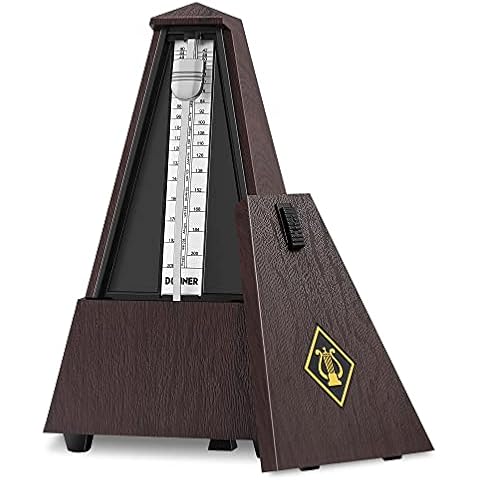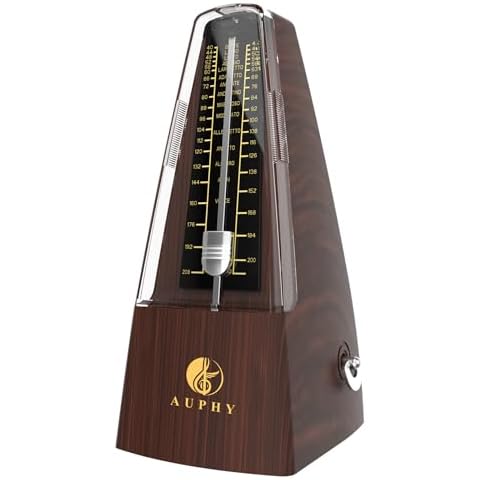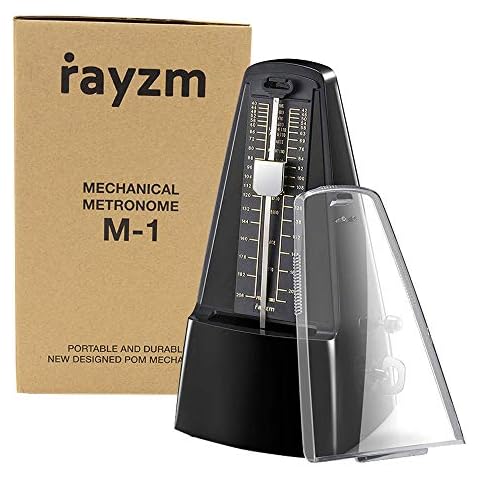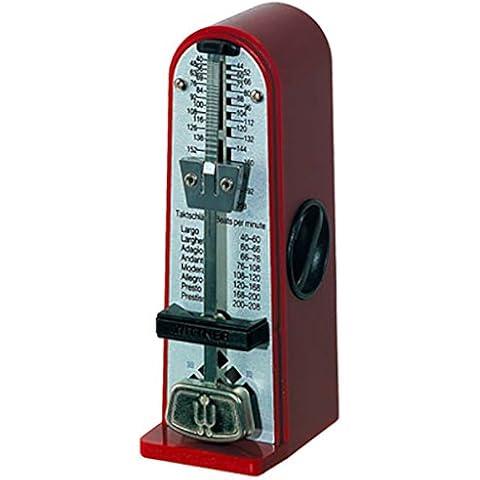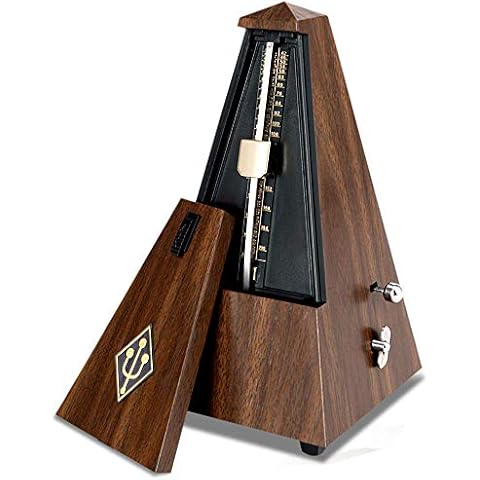Best Mechanical Metronomes of 2025
* We independently evaluate all recommended products and services. If you click on links we provide, we may receive compensation.
Mechanical metronomes are traditional timekeeping devices that are essential for musicians of all levels. These metronomes use a pendulum to provide a steady beat, allowing musicians to practise rhythm and timing. They are often preferred over digital metronomes due to their tactile and audible feedback, which helps to develop a sense of musical timing. Mechanical metronomes come in various designs and sizes, from compact models that can fit in a musician's pocket, to larger versions that sit on a music stand. They are a reliable and affordable tool for musicians to improve their playing.
At a Glance: Our Top Picks
Top 10 Mechanical Metronomes
Donner DPM-1 Mechanical Metronome for Musicians
The Donner DPM-1 Metronome is designed for musicians seeking to enhance their practice sessions. Its easy-to-use pendulum swing lets you select your desired beat and tempo, ensuring you stay on track. The classic pyramid design not only looks appealing but also resonates well with musicians. With a range of 40 to 208 beats per minute and various beat selections, you can tailor your practice to suit your instrument. Plus, the wind-up spring mechanism eliminates the need for batteries, making it a cost-effective choice.
Wittner Taktell Super-Mini Mechanical Metronome
The Wittner Taktell Metronome is a reliable tool for musicians looking to perfect their timing. Its sturdy plastic casing ensures durability, making it a long-lasting companion for your practice sessions. You will appreciate the mechanical wind-up feature, which eliminates the need for batteries, saving you resources and offering practicality. Made in Germany, this metronome guarantees quality and precision, ensuring you can trust it for consistent performance while playing your instrument.
AUPHY Mechanical Metronome with Accent Bell
The AUPHY Mechanical Metronome is an ideal tool for both beginners and seasoned musicians. Its classic design and accurate beats, coupled with an accent bell, help you maintain rhythm effectively. With a metronome speed range of 40-208 BPM and five beat selections, you can tailor your practice sessions to fit your needs. The wind-up mechanism means no batteries are required, allowing you to focus on your music without interruptions. This metronome's robust structure ensures stability and longevity for all your practice needs.
Wittner Taktell Piccolo Mechanical Metronome
The Wittner Piccolo Metronome is crafted from high-quality plastic, ensuring durability and stability for long-lasting use. This mechanical wind-up design eliminates the need for batteries, making it both eco-friendly and convenient for you. Proudly made in Germany, it promises precision and reliability in its performance. With its elegant mahogany brown finish, this metronome is not only functional but also a stylish accessory for any musician, helping you perfect your timing and maintain a precise tempo while playing.
LEKATO Mechanical Metronome with Bell
The LEKATO Metronome is a classic pyramid-style device designed for musicians of all levels. With a tempo range of 40 to 208 beats per minute, it allows you to play various music styles effortlessly. The precision movement ensures a minimal tempo tolerance of 0.08%, helping you maintain rhythm and accuracy during practice. Its user-friendly design means anyone, including beginners and children, can easily operate it. Simply wind it up and adjust the settings to cultivate your musical talent and enhance your rhythmic skills.
Rayzm Mechanical Metronome for Musicians
The Rayzm Mechanical Metronome is a reliable tool for musicians, offering a clockwork design that eliminates the need for batteries. You can easily adjust the tempo from 40 to 208 bpm, allowing you to find the perfect pace for your practice. With high precision, it ensures consistent tempo performance, so you can focus on perfecting your skills. Its solid construction in a classic pyramid shape means it is durable enough for regular use, while the protective cover keeps it safe when not in use.
Linrax M2 Mechanical Metronome for Musicians
The Linrax M2 Metronome is a beautifully designed, wind-up mechanical device that enhances your musical practice. Its classic wood grain appearance appeals to musicians, while its durable, battery-free operation makes it easy to transport. You will find it simple to use, as you only need to select your desired beat and tempo, allowing you to improve your sense of rhythm effortlessly. With a wide tempo range of 40-208 bpm, it caters to various instruments, ensuring you can maintain perfect timing during your practice sessions.
CANTUS Mechanical Metronome for Musicians
The CANTUS Metronome is designed to enhance your musical practice by helping you develop rhythm and maintain tempo. It produces accurate rhythms for a variety of instruments, including piano, guitar, and drums. With an audible click and bell ring, you can easily keep track of your timing without needing batteries. The user-friendly design allows even children and beginners to enjoy up to 18 minutes of continuous sound from a single wind, making it an excellent tool for improving your musical skills.
Wittner Taktell Piccolino Metronome - Ruby Red
The Wittner Piccolino Metronome is designed for musicians who want to enhance their timing skills. Its sturdy plastic casing ensures durability and stability, making it a reliable companion during practice sessions. With its efficient mechanical wind-up design, you won't need batteries, saving you both resources and hassle. Made in Germany, this metronome offers the quality and precision you can trust. The striking ruby red colour adds a touch of style, while its bell-free design keeps your focus solely on perfecting your rhythm.
IronTree Mechanical Metronome with Free Bag
The IronTree Metronome is a battery-free device that provides around 18 minutes of use on a full wind, making it a convenient choice for your practice sessions. It supports a range of instruments, including piano, violin, and guitar, helping you keep time accurately. With a tempo range of 40-208 beats per minute and a clear beat bell, you can easily find the rhythm that suits your needs. Although the volume is fixed, it ensures a consistent sound during your practice.
Frequently Asked Questions (FAQs)
1. How do mechanical metronomes work?
A mechanical metronome uses an adjustable weight on the end of an inverted pendulum rod to control tempo. The weight slides up the pendulum rod to decrease tempo, or down to increase tempo.
2. What are the two types of metronomes?
Today, there are many different kinds of metronomes available, but they can generally be broken down into two main categories: digital and analog. This week we're going to take a look at a few of the different kinds of metronomes out there, as well as the pros and cons of the two big types. But first…
3. What are metronomes used for?
So What Is A Metronome? Traditionally, a piano metronome is a small device that is designed to keep a beat at a certain timing indefinitely. Originally created in the 19th century, metronomes are used to help musicians play songs with the proper time signature and the right pace.
4. How are metronomes powered?
While traditional metronomes are made of wood, the modern ones are made of plastic. Nonetheless, they operate with the same principle – that of a pendulum's movement. In a simple pendulum, there is only one weight attached to a rod. At rest, the weight is at the bottommost position and there is no movement.
During our mechanical metronome research, we found 87 mechanical metronome products and shortlisted 10 quality products. We collected and analyzed 39,211 customer reviews through our big data system to write the mechanical metronomes list. We found that most customers choose mechanical metronomes with an average price of £24.51.
The mechanical metronomes are available for purchase. We have researched hundreds of brands and picked the top brands of mechanical metronomes, including Donner, Wittner, AUPHY, LEKATO, Rayzm.
Hayden was born in Liverpool, and he never left his hometown until university. In his freshman year at the University of Manchester, Hayden was the group leader of a popular music group. Hayden is responsible for the popularity of his music, and this is because of his natural ability to play with keys and strings. He graduated with BFA in 2016 and returned in 2018 as a lecturing staff in the School of Music.
